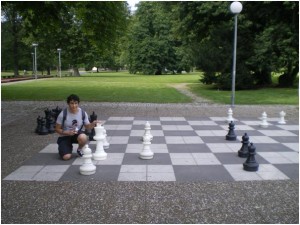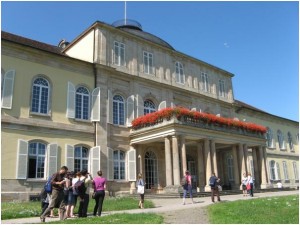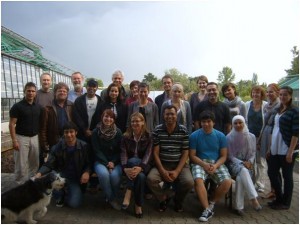During the June / July holidays Armin Geiger attended a summer school at the Universitat Hohenheim. Here is his report:

Pre-departure:
Plan the trip as best you can, especially the dates and times of your flights and train trips. This will enable you to ensure that you have enough time to get from where you are to where you need to be, especially if you have connecting flights etc. This will also help you cut costs. If you are attending a summer school, make use of scheduling information provided by the course coordinator. See what trips and excursions are planned, this will ensure that you don’t plan to go the same place twice.
Leave enough time for your visa application, at least 2 weeks before departure. When going to the consulate to apply for the visa make sure you have all the proper papers, and take along any papers that you think you think might also be useful. Rather take something along and not need it, than not taking it and then needing it. Know the details of your trip, when are you departing? How long are you staying? Which countries are you intending to enter? If you intend to enter more than one country remember to indicate that on your visa application. Be on time for the appointment.
Take luggage that you can carry comfortably, make sure you can be relatively mobile if you are going to be on foot between trains etc. Activate the roaming on your cell phone unless you intend to buy a sim card where you are going.
As part of our summer school course there was an online phase that included a review of the relevant literature as well as an online test that we had to complete. It helps to utilise this fully because the better acquainted you are with the topics before you leave, the less you have to study while you there. This allows you to do more things, whilst still being able to pass the course well.
Try and learn some common phrases and some of the language of the place you are going before you leave. Make use of tools such as Google earth and Google street view to familiarise yourself with the place you are going to. Make travel arrangements as far ahead as possible, book plain and train tickets as far in advance as possible because this can help you cut costs. Use online options as much as possible, for instance use the web-checking facility of the airline. Print your own boarding pass before hand as these speeds things along when you are at the airport and allow you to avoid long lines.
Make sure you adhere to the guidelines of the airline and airport security, such as not carrying liquids more than 100 ml in your hand luggage for both departing and returning trips. Don’t exceed the weight limit of your luggage and keep in mind that you might be bringing back some things with you. If you take a camera make sure you always have an extra set of batteries and a spare empty memory card.
Email electronic copies of your most important documents such as tour passport etc. to yourself so that you can access them from anywhere. Keep your travel medical insurance policy number and a contact number at hand.
Summer School:
The course theme was pathogens, parasites and their hosts and it was composed of both theoretical lectures and practical sessions. These lectures were given by several members of the academic staff, each with their own field of expertise. The topics included parasitoids, bacterial pathogens, animal nutrition, epidemiology, virulence mechanisms of bacteria, role of cytokines, mechanisms of hosts plant resistance, insect-plant interactions, fungal and bacterial pathogens and their hosts, food borne bacterial pathogens and their virulence mechanisms, parasites, pathogens of the honey bee etc.
During the practical session we performed several different experiments. One practical dealt with the phenomena of induced resistance in plants. To demonstrate this concept we infected bean plants with the spores from rust fungi and monitored the plant response to establish the effect of a compound applied earlier to induce a defence response. In another session we studied the life cycle of the parasitoid, Lariophagus distinguendus, and its host, the grain weevil. Using light microscopy we were able to observe these organisms and their interaction with one another at various life stages. Another practical was aimed more at molecular biology, and during this session we conducted an experiment in animal tissue culture. The aim was to observe the migration of a transcription factor into the cell nucleus using immunofluorescence to visualise it under a microscope.

A practical excursion was also arranged to the Wilhelma zoo. Here we were guided through the zoo by the resident veterinarian, who discussed the various pathogens and parasites that affect the resident zoo animals.
In comparison to what I have experienced at Stellenbosch University, the academic program was very similar to the undergraduate BSc program. The mornings consisted of lectures divided into 45 minutes session, and the afternoons were reserved for practicals. At the end of the course we had to complete a written examination. There was also a group assignment as part of the course. We were assigned a topic that we had to present to the rest of the class. Although the grading system differed a bit, all the assignments and final exam contributed to the final mark.
Other activities included a visit the Mercedes museum in Stuttgart. The museum chronicles the development of the automobile and Mercedes Benz in parallel with the history of Germany. During the day we explored the city centre and parks, and in the evening we were able to experience the Stuttgart night life.
The International students organisation (ISO) organised a party on campus at the University of Hohenheim every Thursday night to welcome all international students, although the party is open to everyone. During our time at Hohenheim the university was also hosting its yearly festival of Dies Academicus.
During my free time on the weekends I attended a local rock concert, visited the Hohenzollern Castle in the Swabian Alb and swam in the Bodensee, a large lake on the border. I was also able to visit Austria for one weekend and went on day hike through the Alps.
My Return:
Returning to Stellenbosch was a very difficult process. I felt that the summer school was a bit too short and I did not want to come back, I wanted to stay in Germany a bit longer. We travelled for a long time and so I was tired for a day or so; it also took a few days before I was back in my normal routine. It also did not take as a lot of time to catch up with my work, which I had missed while I was attending the summer school.
One thing that was apparent in the first few days after my return was the difference in the way I got to places. In Germany we were able to travel quickly and safely using trains, trams and busses at a relatively low cost. The system was very easy to use, we travelled to class by tram every morning within ten minutes, and it allowed us to explore Stuttgart and surrounding areas during the day and night. The comparatively low incidence of crime and general feeling of safety also provided a feeling of ease which I happily became accustomed too. Therefore, it was difficult re-adjusting to the daily struggle of traffic, finding parking and the risk of theft and crime.
Seeing what life was like in a first world country changed my perspective on issues such as social responsibility and quality of life. One cannot help to make comparisons between your home country and the country that you are visiting. Although Germany is not perfect, the differences between a first world- and a third-world country were apparent.
The natural beauty of South Africa, especially the Western Cape, is hard to beat. Stellenbosch campus and the surrounding scenery compares well aesthetically to our host university, although the Hohenheim Castle structure and grounds were impressive.
In the few weeks I was over there I experienced so much, saw a lot of new and interesting things and also had the opportunity to learn and interact with people from different cultures and countries. The trip gave me a glimpse of what it would be like to live abroad and given the opportunity I would gladly go on a longer exchange or summer school.

